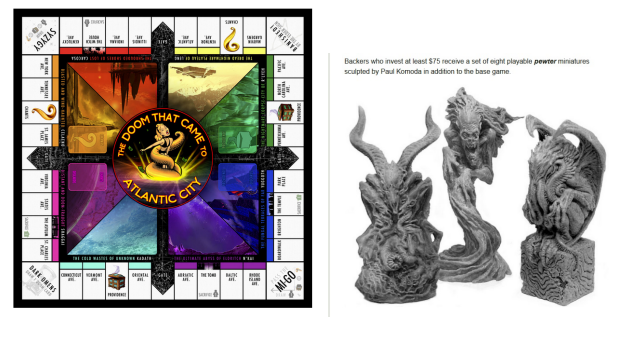
The Federal Trade Commission has taken its first-ever action over a crowdfunding project, finding that its creator used "deceptive tactics" by raising more than $122,000 to create a board game—and then spending the money on things like rent, moving to Oregon, and personal equipment.
Erik Chevalier, who has settled the case, raised the money from 1,246 backers. He promised he would produce a board game called The Doom That Came to Atlantic City, and the campaign came to a successful conclusion on June 6, 2012. According to the complaint (PDF), 85 percent of the backers had pledged $75 or more, the level required to get the pewter miniatures promised backers of the project.
He blew the original deadline of November 2012. Sporadic updates, still available on the project's Kickstarter page, were published between June 2012 and June 2013 explaining the delays and promised that the game was still in production.
On July 23, 2013, Chevalier canceled the project. “After paying to form the company, for the miniature statues, moving back to Portland, getting software licenses and hiring artists to do things like rule book design and art conforming[,] the money was approaching a point of no return," he explained. The post continued:
Suffice to say that I never gave up and always intended to get this project printed. My intentions have always been good and I've struggled with this greatly. I've spent a large amount of time pitching investors, begging banks for loans and seeking other sources of funding to fix this. Sadly I found no takers.
FTC lawyers claim that in reality, Chevalier never hired artists and "instead used the consumers’ funds for miscellaneous personal equipment, rent for a personal residence, and licenses for a separate project."
The settlement order imposes a $111,793.71 judgment, but it's suspended due to Chevalier's inability to pay. "The full amount will become due immediately if he is found to have misrepresented his financial condition," the FTC writes in today's statement on the case.
Chevalier is also barred from any "deceptive representations related to any crowdfunding campaigns in the future," and must honor any stated refund policies. (On Kickstarter, he said he hopes to "eventually refund everyone fully.")
The Doom That Came to Atlantic City was ultimately made available, just not by Chevalier. After the cancellation, the rights to the game and figurines went back to the designers, who were able to link up with Cryptozoic Games and get the game produced. Cryptozoic agreed to fulfill the orders of the Kickstarter backers at its own expense, and sent the games out in 2014.
Chevalier, whose business' name is The Forking Path Co., didn't respond to requests for comment sent through his website.
"Kickstarter creators have an incredible track record when it comes to following through on their promises," said Kickstarter spokesperson David Gallagher. "But creators who abuse our system and backers’ trust expose themselves to legal action. That another creator stepped in to produce this game and get it into the hands of backers is a testament to the goodwill and spirit of the Kickstarter community."
While this is the first time federal authorities have taken action over a crowdfunding campaign, consumer protection authorities in Washington state filed a lawsuit over an undelivered Kickstarter last year. The state attorney general sued Ed Nash and his company for failing to deliver its promised Asylum Bicycle Playing Cards, a "retro-horror themed playing card deck."
Correction: An earlier version of this story said the game "never got sent." Cryptozoic produced the game and sent copies to Kickstarter backers in 2014.
reader comments
85